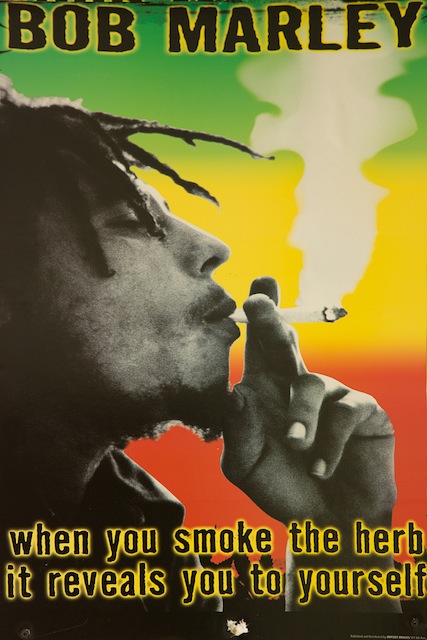Is Cannabis Addictive?
Is Cannabis addictive? The short and not fully instructive answer is “No”, at least not in the bio-chemical sense that substances like alcohol, tobacco, heroin, cocaine, and any number of legal and widely used (and aggressively pushed) pharmaceutical drugs are. Of course casual mention of the concept of addiction will commonly lead people to refer to anything from chocolate to mountain biking as addictive. But the evidence for a true physical addiction of any consequence with cannabis is simply not there. Dependency, what you could call “psychological addiction” however, is a different and complex issue and I’ll get to that in a moment.
Temporary Irritation and Readjustment
If you want to be obstreperous about it, you could make a weak and ultimately irrelevant case that going cold turkey from cannabis can result in some physical withdrawal symptoms. But these are minimal at worst and pass quickly, for the most part no more irritating or long-lasting than withdrawal from regular coffee use. Most of us know, or were, someone who, perhaps during their well-wasted youth, smoked pot daily for years then woke up one morning with the decision to quit firmly in mind. The consequences may have involved a few days of restlessness and sleep disturbance, and/or maybe a few headaches while the organism readjusted, but all soon forgotten.
These assertions are backed up not just by extensive anecdotal reportage but by numerous studies over many years. A quick Google search with words like “marijuana and addiction” or “Is cannabis addictive” produces a sizeable list. Here’s a representative example from a study I found quoted at The Vaults of Erowid.
When human subjects were administered daily oral doses of 180-210 mg of THC – the equivalent of 15-20 joints per day – abrupt cessation produced adverse symptoms, including disturbed sleep, restlessness, nausea, decreased appetite, and sweating. The authors interpreted these symptoms as evidence of physical dependence. However, they noted the syndrome’s relatively mild nature and remained skeptical of its occurrence when marijuana is consumed in usual doses and situations. Indeed, when humans are allowed to control consumption, even high doses are not followed by adverse withdrawal symptoms. [my emphasis in bold]
Fifteen to twenty joints per day? Sorry folks, but if you’re smoking that much, physical addiction is likely the least of your problems.
So please, can we remove the physical addiction objection from the discussion table?
Dependency not Physical Addiction
Dependency is a different issue and worthy of discussion. A point of perspective before continuing: The psychospiritual root of cannabis dependency, or mental addiction if you prefer, is essentially the same as just about any other kind of dependency or obsession. A nearly inexhaustible list would include addiction to sex, food, money, television, computer games, music, work, exercise, complaining, thinking, crime novels, and of course the inner dialogue stories we carry around that fix us in a particular spiritual condition.
To paraphrase Terence McKenna, addictive behavior is any behavior that promotes habitual, unexamined activity. (Terence actually said that in the most meaningful sense a drug is anything that promotes habitual, unexamined behavior. Hence TV, food, and all that.) In other words, we use substances and obsessions of all kinds to avoid looking at what’s really going on and in the big picture, to avoid the incontrovertible truth of the non-existence of the separate ego. And to put that into perspective, unless we are fully spiritually awake and free of all mental obstacles and obscurations, we are all to one degree or another addicts, addicted to whatever behaviors and thoughtforms we habitually use to shore up the walls of our cocoon to keep us from drowning in the light of unconditioned reality.
A Tricky Plant
Cannabis dependency is a particularly tricky version of this kind of ‘addiction’. It appears to offer high entertainment value at a low cost. You could even say this kindly plant will take you just about anywhere you want to go. If you want to escape your emotions or your responsibilities to yourself and the life around you, continual use can definitely help you with that. You’ve seen it, maybe you’ve been it. You can hang out in a foggy dreamlike state where nothing in the external world feels quite real or of much consequence.
Even if you have your feet mostly planted firmly, the delight of that sweetened state can be seductive. It’s a natural inclination to want to spend more time in pleasurable places. But—and this is one of those compelling observation-based suspicions rather than a scientific study—you’ll probably find that the more you want and the more often you come back trying to fulfill that wanting, the more you experience the diminishing return phenomenon. As with all people on spiritual awakening paths, we lovers of cannabis are encouraged to practice—via the ongoing application of mindfulness and awareness—observing without judgement and repeatedly letting go of the stress and unquenchable thirst of wanting.
I know everyone has a different configuration of imprints, tendencies and such, so my sample of one just might not make a peer reviewed journal. I offer you my experience anyway in case it’s applicable. To dive in strong and clean and reveling in the tender-hearted delight and invigoratingly fresh insight of the moment, I generally have to limit my engagement with the sacred cannabis plant to no more often than about every third or fourth day. Sometimes every two days can keep that precious freshness if I don’t do it all the time, but any more frequently than that and it just doesn’t feel right to me. And daily use? There seem to be good reasons for some to do that, perhaps especially for medicinal benefit, but for me and I’m pretty sure for a hell of lot of folks, it’s not a good idea. [Commentary and rebuttal on this point are welcomed.]
Taking the “not a good idea” concept a bit further, in addition to the exhortation toward an honest self-assessment in regard to heavy use, there’s another concern. I’ve come upon this one more than once, most recently in my discussion with Mariano da Silva, a Brazilian ayahuasca shaman who has used cannabis sacramentally for many years. Mariano claims that heavy cannabis use can lead to diminishing personal power over time, a weakening of the psychic force. Mariano has some other very interesting things to say about both sacramental use of cannabis and overly frequent use. He speaks highly of the remarkable potential of cannabis when used more or less sparingly with intention and discipline, while making it clear that with daily use, those powerful, and powerfully beneficial effects, are lost. He elaborates on those themes in a recent Skype interview I did with him from his home in the Brazilian forest that will appear in my eventually-coming book Cannabis and Spirituality (Inner Traditions • Bear and Co., fall 2016).
Mariano’s reference to loss of power also reminded me of stories about Le Club des Hachichins (The Hashish-Eaters Club). This was a group consisting of a number of leading Paris literary figures who met often between 1844 and 1849 to consume hashish in the form of a paste. One of those “littérateurs”, the writer Charles Baudelaire, was more skeptical than some of the others and claimed that continued use of hashish annihilates the will. Something to consider for heavy users.
It may be a worthwhile debate to argue over whether cannabis use is ultimately beneficial or counter-productive on the spiritual path in the long term. If it isn’t beneficial when used wisely, then this whole project goes in the trash bin followed by a tearful apology on the evening news. The problem is that it is, and will remain, damn near—if not completely—impossible to isolate that single influence and come up with any kind of definitive conclusion. And the problem with that is that most people with opinions on the matter will be projecting their pre-existing beliefs and biases onto the issue, especially, in my experience, those opposed to cannabis use.
The bedrock principle as always is for us to trust own own intelligence and find out for ourselves. A brilliant and highly-regarded psychotherapist of my acquaintance sometimes suggests to clients questioning their cannabis use that they lay off completely for a couple of months to see what the difference is and then continue as before if they experience no meaningful change from such abstinence.
Summing up the dependency issue in a nutshell, let me say (with a stroke of brilliant circular logic) that the real-life question, and possibly obstacle, regarding cannabis dependency is: Are you dependent upon it? Again, people deriving clear and necessary benefit for medical reasons get a pass on this one. For the rest of us, the question is whether or not we depend on cannabis for experiences that in the long term we would be better served to experience without cannabis, at least some of the time. In other words, if you believe that life is diminished without cannabis, you might want to take an honest look at that.
A Long-term Realignment
Over a period of time, the condition evoked by Marijuana lends a sense of ease that has been described by many as feeling “normal.”1. Joan Bello
There is certainly a wealth of evidence on record going far back into history and continuing into the present to support the view that skillful use of cannabis can empower the awakening journey. As people like author Joan Bello, a contributor to the aforementioned eventually-coming book, has pointed out, it’s not primarily about the sensation of the momentary high. The high, lovely as it can be, can also be seen as a side-effect of the essential influence of the plant. That involves a long-term realignment toward a more spacious, relaxed, heart-centered connection to nowness.
The counterview to feelings of dependence on the cannabis rausch* is to treat the spaces entered—that deepened, heart-alive, full of wonder state—as entrainment: training by familiarity; recognizing and remembering; not expecting or hungering after any particular experience; not insisting on this versus that, as Buddhist teachings remind us. Dee Dussault, master of Ganja Yoga and another contributor to the book, has described it succinctly. “It was like I was creating a neural groove by practicing high yoga, and by visiting this place often enough, that groove could be tapped into even when I wasn’t high or doing yoga.”
So dear brothers and sisters, the conclusions here are this. Addiction: No. Problematic dependence: A definite maybe. Investigation and Observation: Yes. Focused surrender: Absolutely.
Come, come, whoever you are. Wanderer, worshipper, lover of leaving. It doesn’t matter. Ours is not a caravan of despair. Come, even if you have broken your vows a thousand times. Come, yet again, come, come. – Rumi
———————
* The noun “rausch” is one of those delightful German words that don’t have a truly comparable one-word counterpart in English. It can mean intoxicated or drunk but also has a more uplifting implication of euphoria and even ecstasy.
1. The Yoga of Marijuana, p. 34. by Joan Bello, Lifeservices Press, 2015




Leave a Reply
Want to join the discussion?Feel free to contribute!